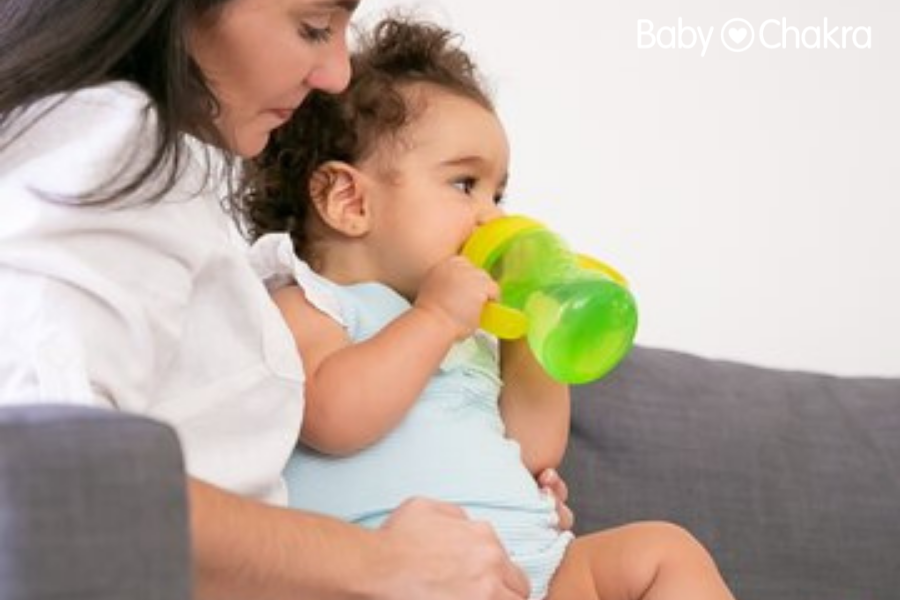
When Can You Start Giving Water To Your Baby?
28 Feb 2022 | 4 min Read
Sayani Basu
Author | 607 Articles
Water requirements for infants vary according to age. Giving too much water before their systems are ready for it can have adverse effects. Water should be given to infants only after they start eating solid foods.
Most medical institutions agree that water should not be offered before six months of age. Too much water can displace valuable nutrition from breast milk and imbalance an infant’s electrolytes.
Till they are a year old, their kidneys aren’t mature enough to metabolise too much water. That is why their water needs are minimal.
Many new parents are not sure when they can start giving water to their babies. Read on to know more facts on water feeding to babies.
Why You Should Not Give Water To Your Baby Before Six Months?
It is not recommended to give your baby water before six months for the following reasons:
- Water feedings would fill up your baby, making them less interested in breastfeeding. This could lead to weight loss and elevated bilirubin levels.
- Water intoxication leads to behavioural changes such as –
- Drowsiness
- Headache
- Nausea and vomiting
- Difficulty in breathing
- Weakness
- Confusion
- Giving water to the infant might cause an imbalance in sodium levels that may lead to –
- Brain damage
- Seizure
- Coma
- Death
When Can Babies Drink Water?
You can start giving water to your baby after six months. The best way to introduce water to your baby is to give her a small amount in a sippy cup.
Don’t force her to drink the water if she rejects it.
Water is given to babies once they start eating baby food. Gradually giving water to your little one also gives her a chance to get used to the plain flavour of the water.
Once they turn a year older, you can offer water or diluted juice in a cup during mealtimes. However, it is recommended to avoid giving fizzy drinks or drinks with artificial sweeteners to them.
As a new mother, you might be confused about your baby’s water needs. Since they are too little to express thirst, it is obvious for you to think that your baby isn’t hydrated properly.
How Can You Know Your Baby Is Thirsty?
Babies generally communicate through various sounds. They would tend to point to the water cup or use sign language to indicate that they are thirsty. During mealtime, if they refuse to eat or swallow food, it indicates that they need water.
When water is offered, babies drink as much as required. If the water cup is taken away, they might become cranky or bend forwards to reach the cup. This indicates that they need more water.
How Much Water Can A Baby Drink?
After your baby is six months older, he/ she needs four to six ounces of water a day, or just over half a cup of water. It depends on babies and their food habits.
If you continue breastfeeding, a few sips are more than enough to hydrate them. Baby dehydration is rare when babies get their required fluids from breast milk. Some of the signs of dehydration in baby’s are –
- Dry mouth
- Sleepiness
- Lesser wet diapers
- Fussiness
Since the baby’s fluid requirements are met by the breast milk, there are hardly any chances of dehydration.
Is It Important To Boil Water For Babies?
It is very important to boil water before babies drink it. Boiling the water helps to kill bacteria and viruses that the unboiled water may contain. Iis it is also important to sterilise the containers in which you store boiled water to protect your baby against infections.
While older children and adults need water to stay hydrated, it’s not the same with newborn babies. Follow your doctor’s recommendations on giving water to your little ones to ensure that they stay healthy.
A


Related Topics for you
Suggestions offered by doctors on BabyChakra are of advisory nature i.e., for educational and informational purposes only. Content posted on, created for, or compiled by BabyChakra is not intended or designed to replace your doctor's independent judgment about any symptom, condition, or the appropriateness or risks of a procedure or treatment for a given person.
